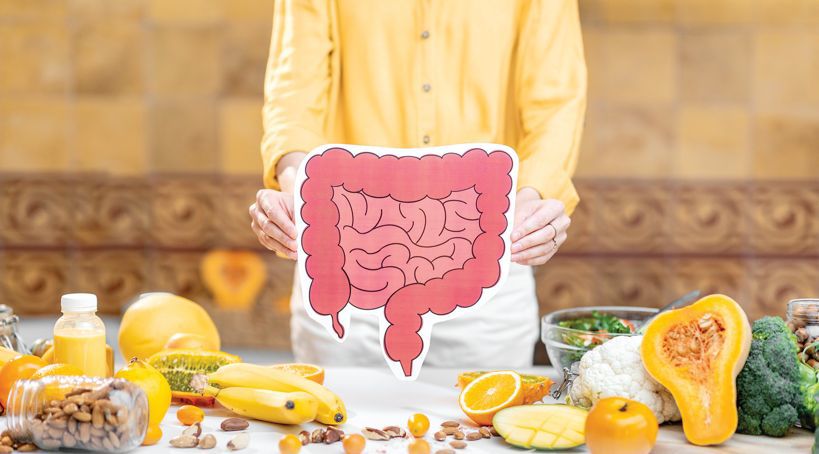
THE human gut not only helps absorb nutrients and fluids, but also has immune and endocrine functions. Istock
Vishal Sharma
THE human gut not only helps absorb nutrients and fluids, but also has immune and endocrine functions. Our gastrointestinal (GI) tract is exposed to a large number of environmental stimuli, including many unwanted stimuli and disease-causing pathogens, through the food and liquids that we eat or drink.
However, the gut can easily differentiate between harmless and harmful stimuli. It protects us from harmful stimuli and ensures that no unregulated immune reaction against innocuous stimuli may harm the GI tract. This delicate balance is ensured by the epithelial cell lining or immune cells in the gut and the resident flora.
A large number of small micro-organisms reside in our gut. More than a kilogram of our body weight is due to these microorganisms, which number more than 100 trillion. They act as a bulwark against the harmful environmental stimuli.
While the definition of a healthy gut is still evolving, it largely refers to a well-maintained gut barrier that ensures only limited exposure to harmful stimuli.
The most important determinant of this protective shield or barrier is the resident flora in the gut. The composition and diversity of this flora, or the gut microbiome, is a consequence of our diet and lifestyle. It may be helpful to think about our resident flora (bacteria, fungi, and viruses) as good versus bad flora. The definitions of good and bad flora are still evolving, but there’s enough evidence to suggest that our diet largely determines our flora.
The impact of diet in shaping gut microbiota was revealed by a comparative study in children from Europe and Burkina Faso in rural Africa. The diet of children in Burkina Faso, similar to early humans, was predominantly vegetarian with abundant fibre, starch, and millets as compared to the western diet that was predominantly animal-based. Children in Burkina Faso had higher bacterial richness and diversity and fewer pathogenic bacteria as compared to European children. In a study from India, the gut microbiome of healthy individuals from Ladakh was different from rural and urban populations in Haryana. The results said people from Ladakh had more number of anti-inflammatory microbes.
In recent years, India has witnessed a rapid rise in metabolic diseases such as obesity, diabetes, fatty liver, and other diseases like inflammatory bowel disease (IBD). While genetic changes are blamed for an increase in metabolic diseases, it is unlikely that genetic changes of such magnitude would accumulate over such a short period of time. Therefore, the blame is largely apportioned to environmental factors. This is majorly due to a change in our diet and lifestyle. Increased intake of high sugar, fatty and processed foods and a reduction in fibre, besides increasing sedentary lifestyles, are behind this rise. Most of this increase is mediated through changes in the gut microbes resulting from dietary changes. Even as gut microbes differ from individual to individual, they are impacted by environmental stimuli, including diet, lifestyle, exercise, and body weight.
Lack of exercise or sleep, stress, use of antibiotics, smoking and alcohol use, eating ultra-processed foods, or foods rich in fat or sugar are well recognised factors that disrupt the healthy gut microbes. This leads to an imbalance in microbes with a reduced diversity.
On the other hand, exercise, a high-fibre diet, the use of yoghurt and other fermented and probiotic foods, adequate sleep, and a higher intake of fruits, vegetables, nuts and seeds can improve gut health and the diversity and types of gut microbes.
Many studies found that changes in diet and lifestyle could alter the composition of our gut microbes. Animal studies have shown that alterations in gut microbial composition through diet or fecal transplants could alter the metabolic processes and help in controlling obesity, fatty liver and diabetes. In fact, emerging evidence suggests dietary therapy helps in the management of diabetes, fatty liver and IBD. The improved understanding of the diet-gut microbe-metabolism axis provides hope that the epidemic of metabolic diseases can perhaps be halted through a healthy gut.
— The writer is Additional Professor, Dept of Gastroenterology, PGIMER, Chandigarh
Join Whatsapp Channel of The Tribune for latest updates.



























